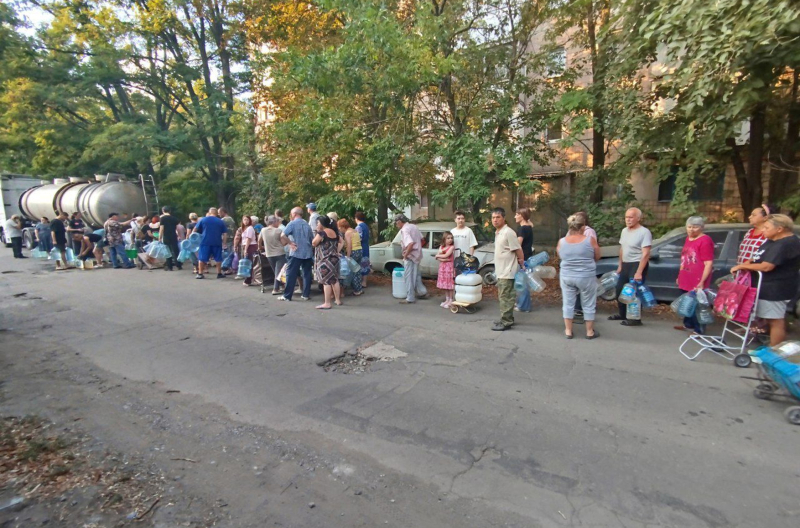The water supply crisis in Russian-occupied eastern Ukraine has reached crisis levels. Officially, water is provided for a few hours once every three days, but residents say their taps can run dry for weeks. Ordinary people fill up bathtubs and bottles anywhere they can, but sewage systems are breaking down, and hospitals have taken to washing wounded soldiers in their own blood. As expected, Russian state-controlled media blames Ukraine, but locals are skeptical of the official narrative. The Insider spoke with residents of the Donetsk region about how they are enduring the water-shortage crisis, what they believe is behind it, and what the future might hold.
MS
A “folk song” about water has gone viral in the Donetsk region of Russian-occupied eastern Ukraine. It contains the lines: “In Moscow they’re crying again, ‘no hot water!’ And I just smile — if only we had your troubles!” Due to the Donbas water crisis, residents are forced to make constant choices: to wash their hair or cook a meal, to wash a child or water the plants, to carry a heavy canister upstairs for a neighbor or save their energy for other things. In local chat groups, residents discuss how many bottles of water are needed to run a washing machine on its quickest cycle.
The summer of 2025 in Donetsk has been scorching, with daytime temperatures soaring to 36–40°C (97-104℉) . One of the most awaited events is rain, as it offers a chance to collect at least a bit of water — enough to wash one’s hands. Some residents go so far as to gather droplets dripping from air conditioners.
Some residents go so far as to gather droplets dripping from air conditioners
“Our grandmothers always kept a stock of dried bread and grains. For us, it’s water — at every opportunity we try to fill every available container. On the days when water is supplied, we rush to refill everything — and we wash, clean, do laundry all at once. It feels like playing a computer game, completing quests level by level, just to survive in our own city,” Olga, a Donetsk resident, told The Insider.
Nadezhda, a nurse at a local hospital, says that because of the water shortage, wounded Russian soldiers sometimes have to be washed “with their own blood.”
“For the past two years, water was supplied every other day for two hours, from 4 p.m. to 6 p.m., and on Thursdays for a full day so people could do their laundry. Now the situation is even worse. When I was working as an orderly at the Kalinin Hospital in Donetsk, we sometimes had to wash wounded soldiers with their own blood. We would soak their wounds in water that was crimson, mixed with soil and gunpowder. And no one was surprised by the unsanitary conditions — there was simply no water, and nothing could be done,” recalls Nadezhda.
Residents of Donetsk have taken to social media to share photos of their tap water — a murky yellow liquid trickling from the faucet. Yet even under such posts, others comment: “Lucky you! We don’t even have that.” Since there is no water to flush toilets, people have begun placing plastic bags, napkins, and paper into the bowl in order to later carry out the waste.
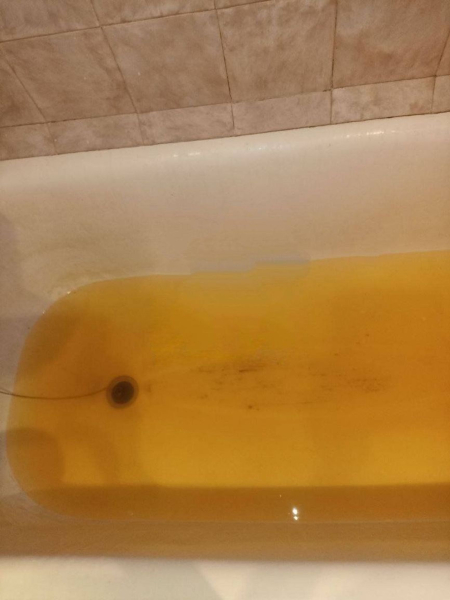
“In the evening, a thin trickle of water might start running — and within an hour, it’s gone. In that time, you have to manage everything: clean the toilet, wash yourself quickly, wash the child. If it’s still flowing, you try to squeeze in the laundry, mop the floors, do the dishes. And right away, you start filling the bathtub to build up a reserve. If I have half a tub of water at home, it even gives me a sense of confidence,” says Olga Talova, a contributor to the pro-Kremlin outlet Anti-fascist.
Water is also delivered by trucks, but not everyone manages to collect it. In Makiivka, a young woman collapsed after waiting in line for several hours, only to find the water had run out before her turn came.
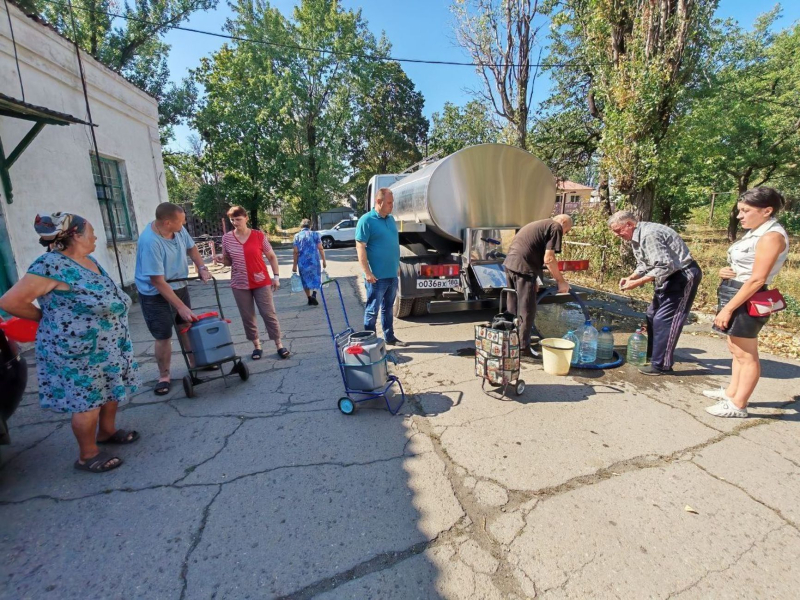
Another option is to buy bottles at kiosks. Donetsk locals say they practically “fought” over the prices and managed to bring the cost down from five to three and a half rubles per liter (from 6 cents to less than 4 cents). And yet, the quality of this water remains questionable.
“We have a water hardness tester, and we found out that the water we buy at kiosks has a hardness level of 386 — while the safe norm for drinking water is up to 200. In other words, what they’re selling us is just the same tap water that comes out of the faucet in Russia,” says Talova.
The shortage of water has even led to open conflicts between neighbors. In Donetsk’s Proletarsky district, one such dispute ended in a fistfight and a police call. Residents accused a family from the ninth floor of cutting off their water pressure. They allegedly broke the locks in the basement, tapped illegally into the main pipe, and installed their own pump and tanks. Maxim, the man accused, insists there wouldn’t have been enough water for everyone anyway — and says he has sick parents to care for.
The real winners are those who own wells. Digging one costs no less than 1,800 rubles ($22) per meter in depth. But beyond the price, there’s another problem: in the coal rich areas, not every household sits above underground water sources. Well owners are urged to share their water with others, but such generosity is not appreciated by everyone. For example, an auto service center in Donetsk’s Kuibyshevsky district handed out well water for free — only for unknown vandals to break its storage tank.
Donetsk region has always been among Ukraine’s more arid areas, but until the start of the full-scale invasion, its water supply — although prone to interruptions — was still functioning, with a steady stream delivered through the Siverskyi Donets–Donbas canal. However, in 2022 and after heavy fighting caused severe damage to the canal’s infrastructure. In early 2025, reports emerged that near Chasiv Yar, Russian forces had used the canal’s collector as cover from Ukrainian strikes — and later set it on fire to conceal their losses. The occupation authorities in Donetsk began drawing water from backup reservoirs, but these proved insufficient.
The Donetsk region has always been an arid area, but until 2022 its water supply at least functioned
“The main source of water supply was the Siverskyi Donets–Donbas canal. Mariupol received 90% of its water from there, while the rest came from the Starokrymske reservoir,” Inna, a former employee of Donbas Water, the company that serviced the canal, told The Insider. “That was a backup reservoir, meaning it wasn’t replenished from other sources. In 1999, it dried up, environmentalists raised the alarm, and only then was it refilled.”
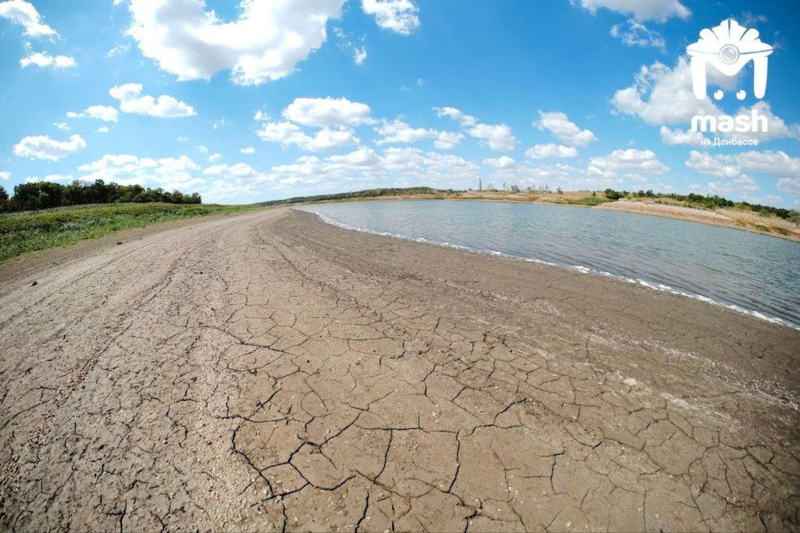
A source who spoke to The Insider said that villagers have begun losing water from their wells:
“That’s a serious warning sign. On top of that, this year we didn’t get the necessary rainfall, and the air temperature was off the charts — 40°C in the shade. That also has an impact. And what’s happening now with the Starokrymske reservoir is nothing short of a catastrophe. The Russians govern here by one principle: leave nothing behind.»
Since 2022, the occupation authorities have been extending the “Don–Donbas” water pipeline into the region, yet even pro-Kremlin media admit it will not cover the region’s needs. The project was overseen by former Deputy Defense Minister Timur Ivanov, who in July was sentenced to 13 years in prison on embezzlement charges. Shortly before the verdict, Ivanov faced new accusations — of taking a 152-million-ruble ($1.9 million) bribe from the head of Olympcitystroy, a company involved in the construction of the Don–Donbas canal.
Russian propaganda blames Ukraine for the crisis, speaking of a so-called water blockade. Yet in Donetsk online-communities, most of the anger is directed at the local authorities and the Russian government. The discontent is evident even in the official video message of Denis Pushilin, head of the occupation administration of the self-proclaimed “DNR.” Pushilin says he hopes to supply water to the city every other day. Residents respond: “At this point, even once every five days would be something — just give us water.”
“I’m not Pushilin, I work for the water utility, and I’ll be honest: there’s very little water, and many won’t get any. Take off your rose-colored glasses — don’t look for someone to blame, because everyone is at fault. The Siverskyi Donets without Dnipro water isn’t much of a source, which is why the pipeline was drawn from the lower Don. If you want someone to blame, there is someone: a certain Timur Ivanov and his team,” reads a post in a local group dedicated to water supply problems.
“There’s been no water for a week, despite the schedule! Pushilin, let your children shower the way mine do!!!” one commenter rages.
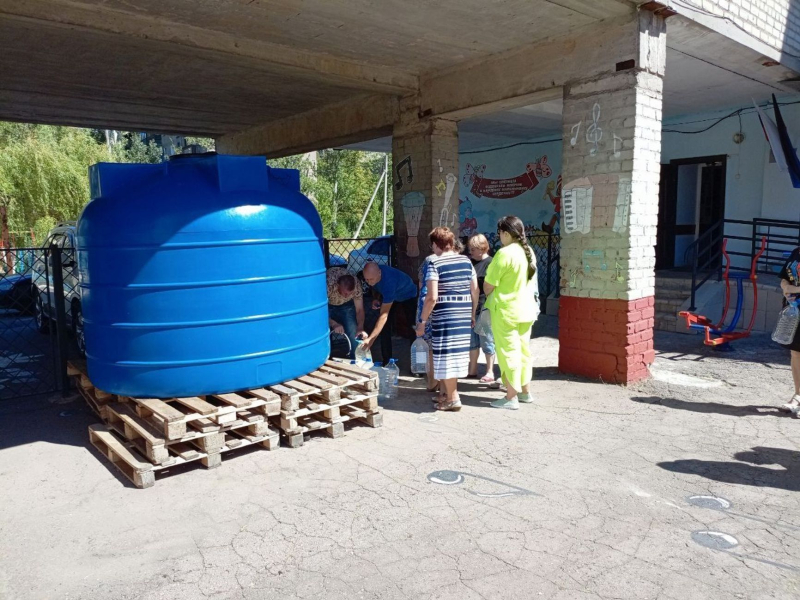
Fears are already being voiced that the crisis will not be resolved before the cold season, which would cause disruptions to the supply of heat.
Some residents, however, have no intention of leaving. “We’ve been without water for three years, and we survive as best we can. I haven’t left since 2014, lived under shelling, and now I certainly won’t go anywhere! This is my home, my city!” Anna, a Donetsk resident, told The Insider.
As Donetsk resident Valentin told The Insider:
“When I look at Donetsk, I see a sick man dying of thirst. One by one, people in suits and ties feed him dirty water from a teaspoon. They make speeches, pose for photos, all the while secretly hoping to earn a medal for ‘saving’ the city.”
Another source echoed these sentiments, saying: “Dehydration — whether of a city or a person — doesn’t happen overnight. Whether it brought itself to this state or someone helped it along, that’s for a doctor to determine. Soon it will be three years since we became part of the Russian Federation — and every year the water supply only gets worse! Why? I understand: in summer, it’s summer’s fault; in winter, it’s winter’s fault. There’s no water, but somehow we’re told to ‘hang in there.”


